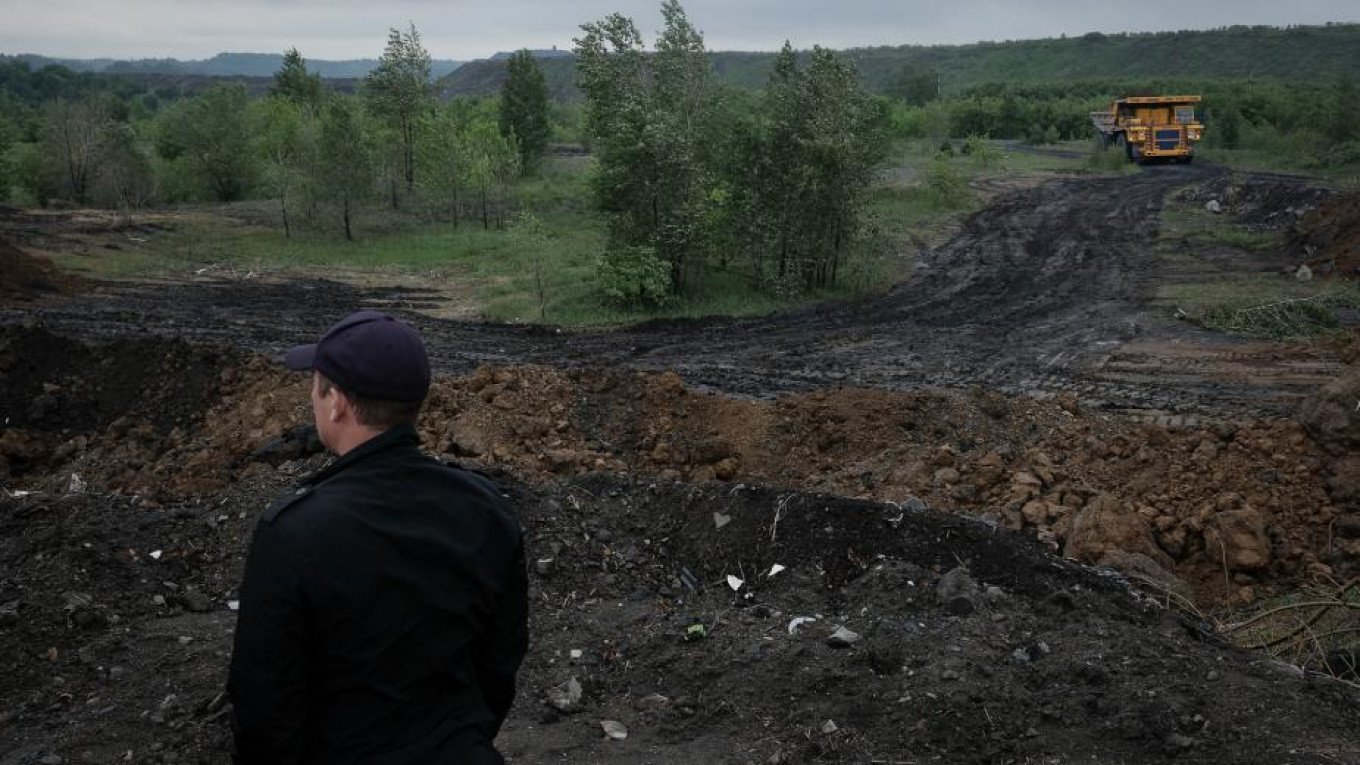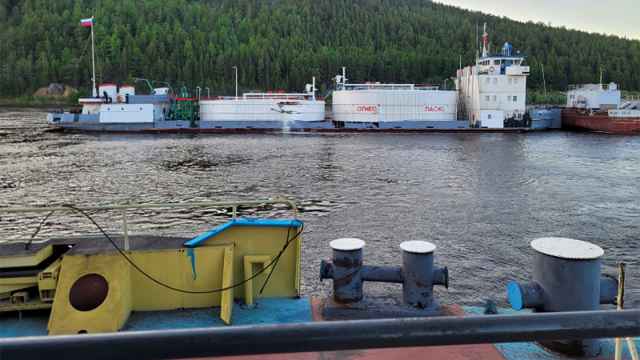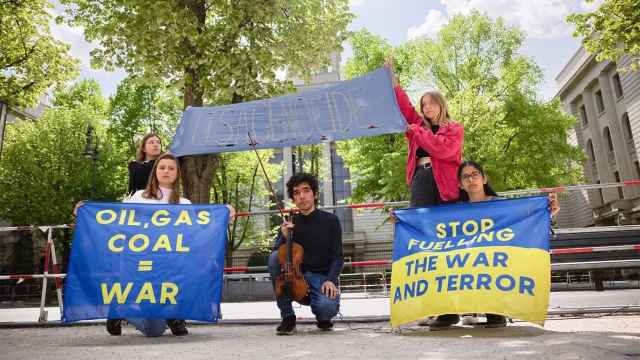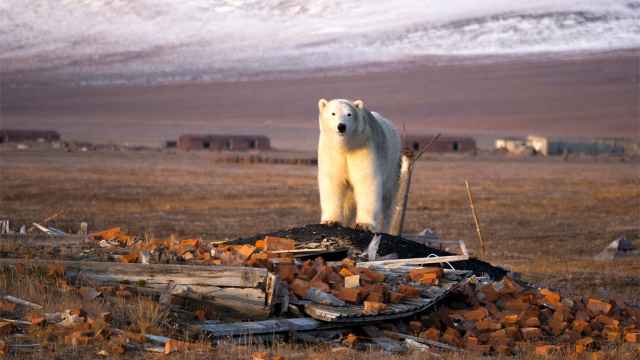Fifteen activists from the Russian coal-mining town of Podzemgaz released a video address to UN Secretary General Antonio Gutteres and Canadian Prime Minister Justin Trudeau on June 8, complaining about their dire ecological situation and asking for asylum.
The activists said they are suffocating — because of coal dust and exhaust fumes emitted by heavy machinery. In the winter, the snow in their town is black and their children can’t go to play outside.
Meanwhile, homes in the area are crumbling due to blasts at the mines and local authorities have ignored all their calls for help.
“Honorable Justin Trudeau, we are all hard-working people. We know how to work and that’s what we’re good at. We have children and we don’t want them to suffer from oncological or other diseases that are exacerbated by poor environmental conditions. We’ve tried everything to solve our problems, but nothing has helped. We have chosen Canada because it is very similar to our Siberia. There is a lot of snow and it’s cold. The nature is practically the same. It’s possible that our mentality is different, but it’s always easier for people to change themselves in favorable conditions. Clean air and clean water are becoming inaccessible in many cities of Kuzbass (Kemerovo region). But we are humans, we have children and we simply want to live. We can be of use to Canada, as in Russia we have simply been forgotten and have become expendable and unneeded persons.”
After the video’s publication, we go to Podzemgaz to report. The windows of the inter-city bus reveal a landscape that is overwhelmingly industrial, dotted with five-story piatietazhka residential buildings and grocery stores.
It’s clear that the amount of land suitable for life is quickly disappearing here. Huge open-pit coal mines are taking over on all sides. The setting is moon-like. Residue from mines and heavy machinery are piled up right behind the bus station in Kiselyovsk (population 88,000). It feels as if we’ve arrived at a coal mine rather than a city. In fact, the city has essentially turned into one big coal pit.
To get to the now-famous town of Podzemgaz, we switch to another bus in Kiselyovsk that will take us there.
We finally arrive.

There’s a video on YouTube in which smoke can be seen pouring out of the earth, about 30 meters away from a few houses. We arrive at the spot and find that the ground has been covered with clay. But locals tell us that the problem is far from solved.
“It used to be alright,” Svetlana, who has lived in Podzemgaz for 11 years, says.
“Now, it’s absolutely unbearable. There are huge BelAZ haul trucks that pass through here and the smoke is horrible. I don’t know how we’ll continue living. They’ve covered up the ground now, but the fires could just come up in another spot — maybe even in someone’s house. People could go to sleep and simply not wake up in the morning.”
She remembers a fire in 2005 in which “open flames shot out” from the earth. According to Svetlana, the spot where the fire originated was covered up.
“Recently there was a house that caught fire on Malinnaya street; the combustion happened right under it,” says Anastasia Sokolova, a mother who has lived in Podzemgaz for seven years.
Her home is nearby. Despite its poor environmental record, she settled down in the town because she couldn’t afford to live anywhere else.
She says that flames shot out from cracks in the ground as recently as May. Firefighters responded to her calls three times, but eventually said they would no longer come because the source of the fires is under ground. They advised her to have buckets of water ready to put out the fires herself.
Local authorities insist that the cause of the fires is trash. Local residents, meanwhile, say that there have never been any trash dumps in the area and that the smell of the smoke is that of coal burning.
Vitaliy Shestakov, who lives just down the road, says that there was once an underground mine called Kiselyovskaya in the area, which has long since been abandoned.
Shestakov has recently become Podzemgaz’s most recognizable activist, without ever intending to be so. While he was showing a national television crew a spot of earth that was emitting smoke, his leg sank through the soil, causing second- and third-degree burns. Shestakov has a limp now and has to make frequent trips to the hospital to change his bandages. The Investigative committee is currently looking into the incident.
There are signs that say “STOP NO ENTRY” in the area. Locals say they were put up after Shestakov’s accident.
“So there’s a sign now. But will it stop children from going where the smoke is coming from?” asks Irina Nikitina, a local accountant and mother of two children.
‘Underground gas’
Podzemgaz (a contraction meaning “underground gas” in Russian) got its name thanks to a gas extraction station that operated here in the 1970s-1990s, but the town itself grew up around the Kiselyovskaya mine.
Podzemgaz is technically a part of the city of Kiselyovsk, but it’s the kind of town that doesn’t belong to either the city or the countryside.

You won’t find signs of urban civilization here. The only streetlights are on the main road. The roads here haven’t been covered with gravel in a long time and are rarely cleared of snow in the winter. The sole store in the town has little to offer. Shestakov complains that it often stocks food that is expired. Nikitina says that local babushkas have to travel to Kiselyovsk just to buy salt. The bus comes only every 50 minutes. If you want to buy bread at the local store, you have to do it in the morning because it always runs out.
There is just one playground for children in the town. It has a single metal slide and a swing set. The local school was closed six years ago. When Nikitina moved here in 2010, the kindergarten had already been shut down. She now has to travel to another district in the city to take her kids to preschool before going to work, spending up to 200 rubles ($3) per day on public transport.
But the coal pits that surround the town on all sides are the biggest problem. Surrounded by mountains of slag heaps, Podzemgas is practically situated at the bottom of a funnel. The closest coal pit mine (Krasnobrodsky) is just 800 meters from the Nikitins’ home. Irina’s relatives, meanwhile, live just 300 meters away from the mine, and just 30 meters away from a service road used by huge BelAZ trucks — each of which weighs several tons.
Coal dust covers everything in the area, including the gardens set up by locals. They use fertilizer to make their plants grow, but you can’t call the produce ecologically clean.
Meanwhile, blasts at the mine are slowly destroying homes in the area. They are covered in cracks which sealing foam is powerless to stop.
“At the beginning, we spent a lot of money on repairs,” Nikitina says.
“Now we know that there’s not much point, though we still have to do renovations twice a year. We cover the ceiling in panels, but they simply crumble. The floor caves in under the baseboard so it gets cold and the children often get sick: they cough and get colds.”
The Nikitins’ house is quite sturdy, by local standards. Other residents of Podzemgaz say they fear their walls might collapse or their ceiling cave in as a result of the next blast.
Many have suffered from serious health problems. A 12-year-old was recently diagnosed with rheumatoid arthritis — a disease that is much more common in old age, according to the doctor that treated him. The disease could have either been caused by stress or poor environmental conditions, he said. There are also many cancer patients in Podzemgaz, which they blame on the tremors, coal dust and smoke.
Locals say it’s practically impossible to sell their homes for a chance to get out of the area. Potential buyers are immediately put off when they hear the name of the town.
“Many people from our street simply abandoned their homes and left — or at least those that had the opportunity. Our children now play in the ruins of abandoned houses,” Irina says.
The topic of children is a difficult one for Irina and her neighbors. They can’t be kept indoors but letting them out to play in the street is not easy when the snow is black and it’s hard to breathe because of the smoke.
Many of the locals who asked for asylum in Canada work at the coal mines. There isn’t much else in the way of work for men in Kiselyovsk. Yevgeniy — Irina’s husband — is a crane operator at the Kiselvoskaya mine.
The activists in Podzemgaz say they aren’t against the coal mines but simply want to live in normal conditions.
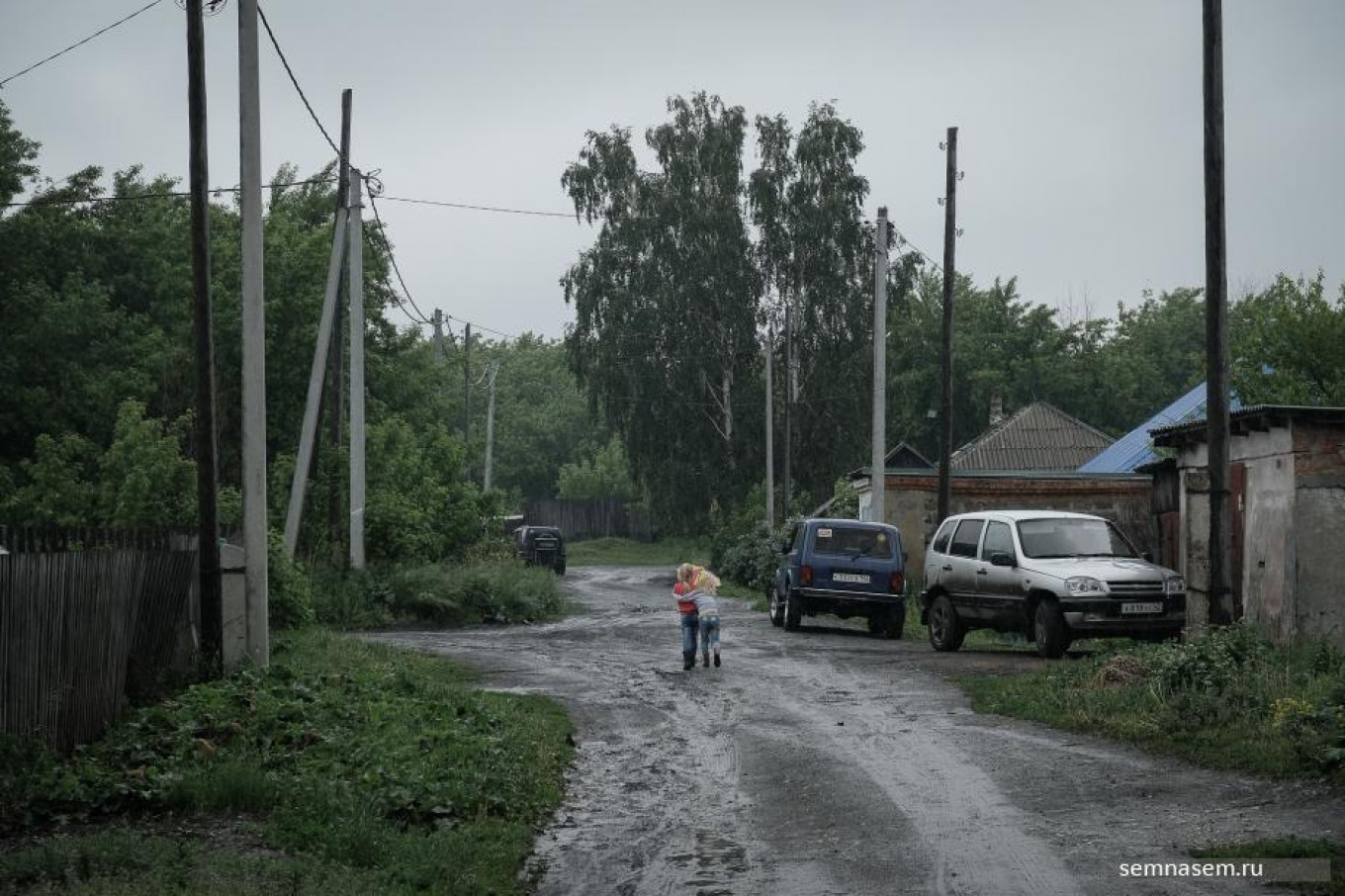
“Social services showed up here after we released the video address. They asked why we hadn’t asked them for help. What help? We all work,” Nikitina says.
She adds that some women had indeed reached out for help but were told that their earnings exceeded the subsistence wage for the region.
“That’s all the help they were offered. With this government, no one cares about anyone else.”
She adds that while only 15 people had participated in the video address, the majority of the town had expressed solidarity with the activists.
People have lost faith
The activists in the town are not in the minority, Natalia Zubkova, the editor of the local Novosti Kiselyovska outlet, says.
“The majority are workers, but there are also teachers, doctors and a librarian,” she says.
She answered our questions in a series of messages.
How did locals respond when news about the video address went national?
At first it was like hearing a thunderclap on a clear day. People from other cities started calling their relatives in Podzemgaz to find out if they had been arrested. Then the messages started coming in on social media for Vitaliy from the whole region. There were 20-30 messages a day. “We want to join you!” they said. It was terrifying to learn how many people want to leave Kuzbass, or even the country! People have lost faith. I think it was a good wakeup call for everyone. It showed that there are people who want to defend their right to clean air and a safe environment. Those that were afraid to do this saw that defending your constitutional rights doesn’t always result in criminal sentences. People are just fed up with the fact that the constitution is not being followed in Kuzbass. I hope that the authorities have also drawn conclusions from this.
Zubkova played an important role in bringing attention to the activists’ video address.
“All of Kiselyovsk is a disadvantaged area, everything is covered in darkness,” she says.
“The town of Podzemgaz is in the worst situation, as there are people there who are in immediate danger.”
“The children get sick because they aren’t able to go outside. Because of the smog, walks outside are not healthy. And in the summer, there aren’t many places to go anyway — there’s only one playground in the area. There are 18 apartments in my building, and six families have already left. But not everyone can afford to leave. For our town, selling a renovated 3-bedroom apartment for 700,000 rubles (around $11,000) would be considered a stroke of luck,” she says.
Natalia remembers that many locals benefited when the underground mines in the area were first replaced by pits, from which it is cheaper to extract coal, about a decade ago. Good compensation packages were offered to those whose houses were slated for demolition to make space for the mines. Many locals were able to move to other regions like Krasnodar. But in 2013, “it all turned for the worse,” she says. Locals whose houses ended up next to the widening pits were no longer compensated.
“The town will soon look like one giant landfill. There are already nine open coal mining pits and three mineral processing plants. They’re building another big one now, near to where I live. That will really finish us off!” she says.
An act of desperation
Many activists in Podzemgaz have admitted that they’re not ready to emigrate yet. They say they’d like to remain in Russia, but somewhere other than Kiselyovsk. They hope to receive the compensation that they are entitled to by law as residents of mining territories. For years, they’ve written appeals to the city and regional governments and even to the presidential administration. But these were all ignored. Their address to the Canadian prime minister and the UN general secretary was thus an act of desperation.
The activists say that the governor of Kuzbass, Sergei Tsivilev, didn’t leave them with a choice. Residents of Kemerovo, the regional capital, launched protests after a deadly fire on March 25, 2018, at the Winter Cherry shopping mall that killed 60 people, including 37 children. The governor said at the time that protests would only destabilize the situation.
“The people [of Podzemgaz] didn’t go on hunger strike or protest. They chose another path. Since 2007, they’ve consistently argued that living in the area is dangerous because of the underground fires. But no one has listened to them. Now they’ve made sure that the entire world knows who they are. And they’ve succeeded,” Zubkova says.
When Governor Tsivilev was asked about the video address of the Podzemgaz residents, he gave the following reply:
“They wrote to the Canadian prime minister. But what will change as a result? They’ve discredited Kuzbass and they’ve discredited the Russian Federation. They didn’t act constructively but decided to act negatively… What kind of attitude can I have about such people? If they care about their region and are concerned about it, then I respect them. But if these people don’t give a damn about their region and do everything to discredit it then…”
A Russian version of this article was originally published by 7x7
A Message from The Moscow Times:
Dear readers,
We are facing unprecedented challenges. Russia's Prosecutor General's Office has designated The Moscow Times as an "undesirable" organization, criminalizing our work and putting our staff at risk of prosecution. This follows our earlier unjust labeling as a "foreign agent."
These actions are direct attempts to silence independent journalism in Russia. The authorities claim our work "discredits the decisions of the Russian leadership." We see things differently: we strive to provide accurate, unbiased reporting on Russia.
We, the journalists of The Moscow Times, refuse to be silenced. But to continue our work, we need your help.
Your support, no matter how small, makes a world of difference. If you can, please support us monthly starting from just $2. It's quick to set up, and every contribution makes a significant impact.
By supporting The Moscow Times, you're defending open, independent journalism in the face of repression. Thank you for standing with us.
Remind me later.



